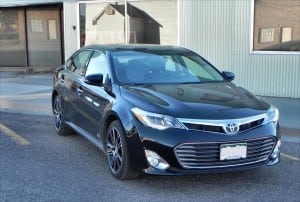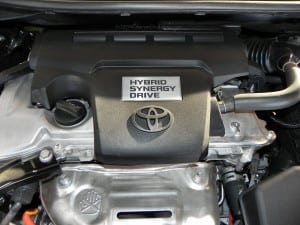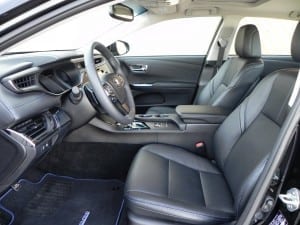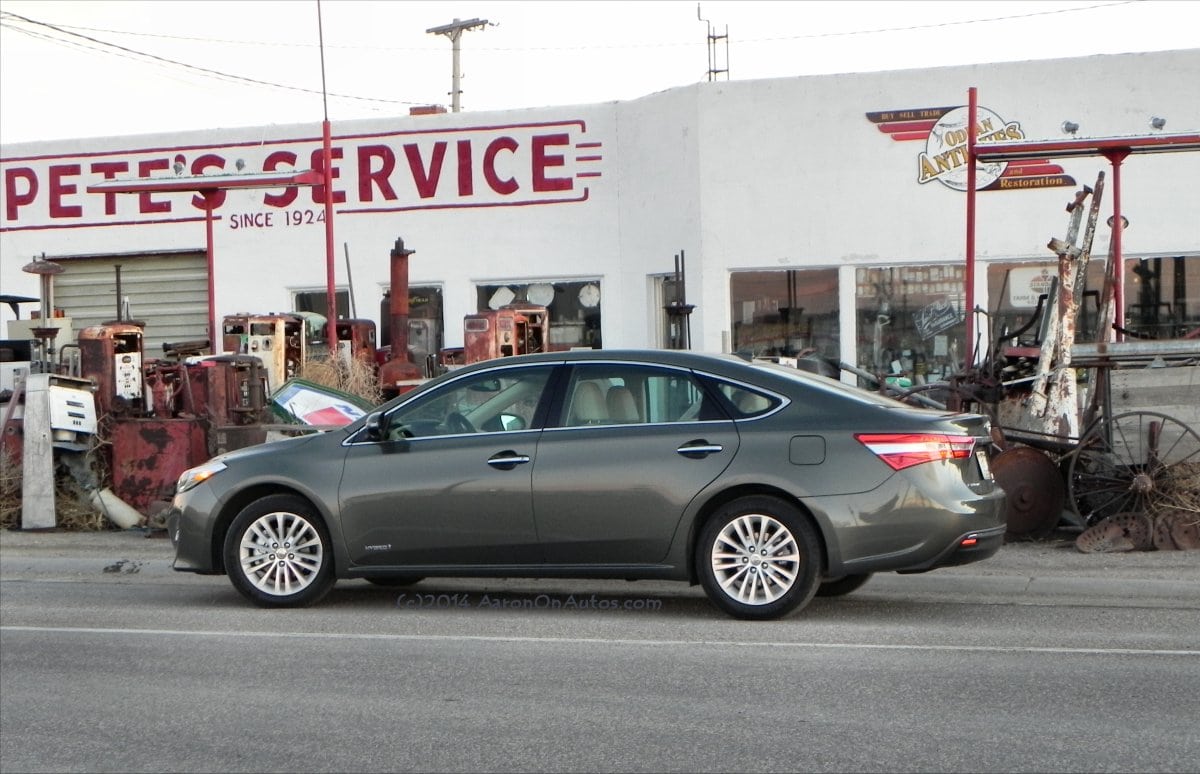In today’s Showdown, we’re comparing the Toyota Avalon with the Avalon Hybrid. Physically, in terms of design and most interior accouterments, the two vehicles are exact duplicates. The 2014 and 2015 model years are virtually unchanged, so our comparison is valid for either 2014 or 2015 model comparisons on the dealers’s lot. Our goal here is to decide whether one is a better purchase than the other for most drivers.
Fast VS Facts
| Contenders: | 2015 Toyota Avalon | 2014 Toyota Avalon Hybrid |
| MPG (comb.): | 24 | 40 |
| Base Price: | $32,285 | $41,400 |
| Strong Point: | Well-rounded | Highly efficient |
| Weakness: | Cushy Ride | Pricey |
| Showdown Score: | 14 | 14 |
Daily Use Ergonomics
Avalon: 4 | Avalon Hybrid: 3
 Because the two cars are nearly identical, their daily use is basically the same. The Avalon is a big, roomy sedan and though it is the smallest in its class, it is still of a good size and will accommodate five passengers nicely. The trunk in the hybid is smaller and you do lose some versatility through that and the limited seat folding, but for most daily use, there is little difference between the cars.
Because the two cars are nearly identical, their daily use is basically the same. The Avalon is a big, roomy sedan and though it is the smallest in its class, it is still of a good size and will accommodate five passengers nicely. The trunk in the hybid is smaller and you do lose some versatility through that and the limited seat folding, but for most daily use, there is little difference between the cars.
Family Friendliness
Avalon: 4 | Avalon Hybrid: 4
Here, again, the two cars are basically the same. The Avalon in both renditions seats five and has plenty of trunk space. Adding car seats is easily done in either package and getting in and out of the car is also with the same ease and comfort. Around town, they drive similarly and park just as well.
Ride Comfort
Avalon: 3 | Avalon Hybrid: 5
 It’s with this metric and the next that we’ll see the largest differences between the Avalon and its Hybrid brother. The regular Avalon is a good driver, but has a lot of body roll that some may find uncomfortable. The heavier Avalon Hybrid, with its battery pack midships, and stiffer suspension offers a more controlled ride that doesn’t become sport-stiff, but instead becomes a balance of comfort. It’s well done and one of the chief benefits of the hybrid drivetrain beyond MPG.
It’s with this metric and the next that we’ll see the largest differences between the Avalon and its Hybrid brother. The regular Avalon is a good driver, but has a lot of body roll that some may find uncomfortable. The heavier Avalon Hybrid, with its battery pack midships, and stiffer suspension offers a more controlled ride that doesn’t become sport-stiff, but instead becomes a balance of comfort. It’s well done and one of the chief benefits of the hybrid drivetrain beyond MPG.
Powertrain Efficiency
Avalon: 3 | Avalon Hybrid: 5
Here, obviously, the hybrid wins hands down. The highway MPG for the two cars is good, but in the city, the hybrid is far superior. In overall mixed driving, the Avalon Hybrid nearly doubles the mileage of its counterpart. This means that although the hybrid model has a large price premium, that premium will likely pay off over time for the owner who plans to keep this car out to five years or more. That premium will not likely be recouped on a three year lease, however.
Final Assessments
 Between the two cars, the hybrid likely make sense for most buyers who can afford to pay the premium up-front. In practical terms, that premium means $30-$50 per month in added payment over a three year loan. That can be amortized, however, thanks to the higher resale value and lower fuel costs associated with the Avalon Hybrid versus its V6-powered brother.
Between the two cars, the hybrid likely make sense for most buyers who can afford to pay the premium up-front. In practical terms, that premium means $30-$50 per month in added payment over a three year loan. That can be amortized, however, thanks to the higher resale value and lower fuel costs associated with the Avalon Hybrid versus its V6-powered brother.
Outside of efficiency and cost, though, the two cars are largely the same. Those who prefer a cushy, “old school” ride with a lot of roll will like the gasoline option whereas the hybrid offers a stiffer, more sure-footed feel for those preferring a modern, tuned drive.
To read the individual reviews of the Showdown contenders, links are below for your convenience.







